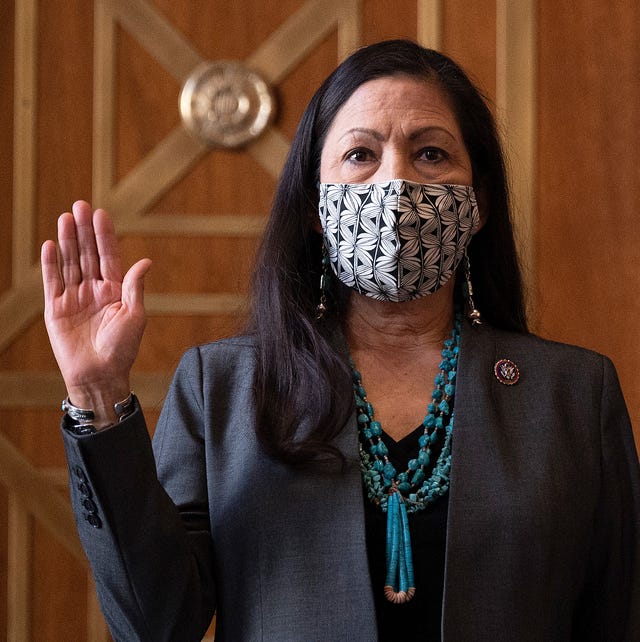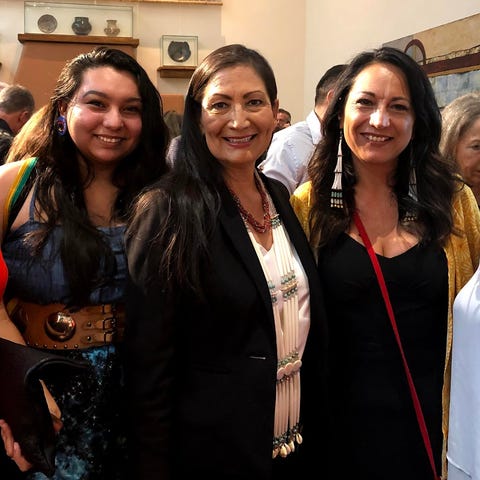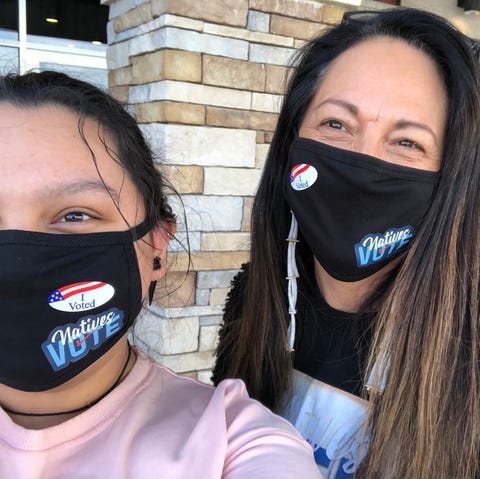Her ascent to the Department of the Interior is nothing short of transformational for Native Americans.
AS TOLD TO ROSE MINUTAGLIO
MAR 26, 2021

JIM WATSON
Crystal Echo Hawk is an enrolled member of Pawnee Nation in Oklahoma and the founder of IllumiNative, a nonprofit working to increase the visibility of—and "challenge the negative narrative about"—Native Nations.

JIM WATSON
Crystal Echo Hawk is an enrolled member of Pawnee Nation in Oklahoma and the founder of IllumiNative, a nonprofit working to increase the visibility of—and "challenge the negative narrative about"—Native Nations.
Below, Echo Hawk on needing to "reset the relationship" between the U.S. government and tribes—and why she believes Secretary Deb Haaland, who made history last week as the first Native woman to head the Department of the Interior, is the one to lead the charge.
My grandfather, Ernest Echohawk, was taken from his family at a very young age and put into a boarding school, where he was abused and beaten for speaking his own language. He passed away in 2005 and, at the end of his life, had so much sadness about what was stolen from him. In his final years, I watched as he tried hard to remember our language. It was clear the pain of what he had experienced never left him.
When he was alive, my grandfather served on our tribal council and dealt a lot with the Bureau of Indian Affairs, which was so paternalistic and, in so many ways, demeaning to our people. I can only imagine how emotional he would be if he were still alive to see the first Native American Cabinet secretary—not to mention that it is a woman.
Deb Haaland's secretary of the Interior confirmation is transformational for Native people. Finally, a leader who can help Americans understand that we are human beings—not caricatures or mascots. We aren't a peoples that don't exist anymore. We are here.
My elders who are still alive never thought this could be possible—and certainly not in their lifetimes. I just wish my grandfather was here to witness this history-making moment, too.
My grandfather, Ernest Echohawk, was taken from his family at a very young age and put into a boarding school, where he was abused and beaten for speaking his own language. He passed away in 2005 and, at the end of his life, had so much sadness about what was stolen from him. In his final years, I watched as he tried hard to remember our language. It was clear the pain of what he had experienced never left him.
When he was alive, my grandfather served on our tribal council and dealt a lot with the Bureau of Indian Affairs, which was so paternalistic and, in so many ways, demeaning to our people. I can only imagine how emotional he would be if he were still alive to see the first Native American Cabinet secretary—not to mention that it is a woman.
Deb Haaland's secretary of the Interior confirmation is transformational for Native people. Finally, a leader who can help Americans understand that we are human beings—not caricatures or mascots. We aren't a peoples that don't exist anymore. We are here.
My elders who are still alive never thought this could be possible—and certainly not in their lifetimes. I just wish my grandfather was here to witness this history-making moment, too.

Echo Hawk (far right) with her daughter Wicanhpi EchoHawk (far left) and Secretary Haaland (center).
COURTESY CRYSTAL ECHO HAWK
I saw firsthand growing up how hard Native women work in the leadership roles they hold in our communities. But looking outward into society, we were always invisible. No matter what tribe we came from. Too often in this country, Native people, and especially Native women, are considered insignificant. We operate in a space in which nearly 80 percent of Americans know little to nothing about us. A significant portion of that percentage aren't even sure we even exist.
Our invisibility is our greatest threat.
When Secretary Haaland was first elected to the House of Representatives in 2018, she helped us dream. She became a voice for Native people in a country that cannot conceive Native people in a 21st century context. She spoke out on a range of issues, not just ones important to her constituents in New Mexico, but she also spoke out on key issues like the murdered and missing Indigenous women epidemic, which has been largely ignored in this country up until recently. We're talking thousands of Indigenous women and girls who have been killed or who have disappeared, with no justice in sight.
Two years later, as COVID-19 spread to the U.S., there was hardly any coverage of how the virus was impacting Native American tribes. In that moment, our invisibility became a matter of life and death. Secretary Haaland, who was a congresswoman at the time, was one of just a handful of voices advocating on a national level for the federal government to come up with a response to support Native communities.
This content is imported from Twitter. You may be able to find the same content in another format, or you may be able to find more information, at their web site.
When I heard she was in contention for Secretary of Interior, I knew how profound this moment could be. The Department of Interior is the agency responsible for managing the federal government's "trust responsibility" to tribes and to Native Americans.
[Editor's note: The U.S. government has imposed itself as the "trustee" for various tribal lands. This "trust responsibility," as it's called, holds the federal government accountable for protecting "tribal and individual Indian lands, assets, resources, and treaty and similarly recognized rights," according to the Department of the Interior.]
RELATED STORY

Deb Haaland on Native American Voter Suppression
OCTOBER 2018 !!!!!!!
It is important to understand the harm that the agency has historically caused. Peel back the curtains and you'll find so much dark history, corruption, and mismanagement of resources belonging to tribes and individual Native Americans. One of Secretary Haaland's Interior predecessors gave a speech about the extermination policy of Native Americans—and that wasn't even that long ago.
To have a Native leader sitting in that role, and to have the opportunity to begin to reset the relationship between the federal government and tribes, which is one that has been characterized by genocide, violence, removal, and corruption—well, it is revolutionary.

Echo Hawk and her daughter, Wicanhpi Winyan, last year.
COURTESY CRYSTAL ECHO HAWK
IllumiNative helped host a virtual watch party on the night of the Senate vote to confirm Secretary Haaland. More than 21,000 viewers tuned it. It was beautiful, people from all over Indian country came together as the final votes trickled in. My daughter, Wicanhpi Winyan, texted me and said, "Mom, I want you to know I'm watching!" For her—someone who was relentlessly bullied in school for her looks and for having a traditional Dakota name—to see a Native woman ascend to that level of leadership was so empowering.
The implications of this moment are beyond what we can even imagine, especially for future generations, and especially for Native women.
Will Secretary Haaland solve every problem overnight? No, because it's so much bigger than that. But this is an important start.
This interview has been lightly edited and condensed for clarity.
It is important to understand the harm that the agency has historically caused. Peel back the curtains and you'll find so much dark history, corruption, and mismanagement of resources belonging to tribes and individual Native Americans. One of Secretary Haaland's Interior predecessors gave a speech about the extermination policy of Native Americans—and that wasn't even that long ago.
To have a Native leader sitting in that role, and to have the opportunity to begin to reset the relationship between the federal government and tribes, which is one that has been characterized by genocide, violence, removal, and corruption—well, it is revolutionary.

Echo Hawk and her daughter, Wicanhpi Winyan, last year.
COURTESY CRYSTAL ECHO HAWK
IllumiNative helped host a virtual watch party on the night of the Senate vote to confirm Secretary Haaland. More than 21,000 viewers tuned it. It was beautiful, people from all over Indian country came together as the final votes trickled in. My daughter, Wicanhpi Winyan, texted me and said, "Mom, I want you to know I'm watching!" For her—someone who was relentlessly bullied in school for her looks and for having a traditional Dakota name—to see a Native woman ascend to that level of leadership was so empowering.
The implications of this moment are beyond what we can even imagine, especially for future generations, and especially for Native women.
Will Secretary Haaland solve every problem overnight? No, because it's so much bigger than that. But this is an important start.
This interview has been lightly edited and condensed for clarity.
No comments:
Post a Comment